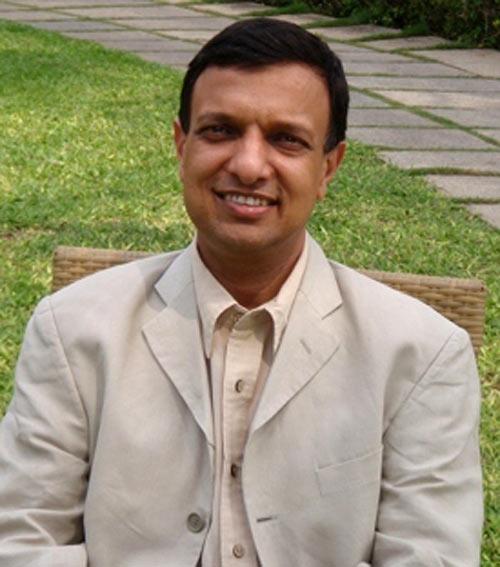Photographs: Courtesy Pagalguy.com
Yale fellow and IIM-Ahmedabad alumnus Dr Nachiket Mor's advise to India's young students about the career they choose: Don’t worry about negative feedback. Ask if you are learning something out of it.
Dr Nachiket Mor is one of the few people who followed his heart and has successfully moved from a corporate career to the social sector.
He is currently on the Board of Care India and Sughavazhvu Healthcare and is former director of India's largest private lender ICICI Bank Ltd.
Dr Mor was also one of the several people closely involved in the evolution of the Indian financial markets during 1987-2007.
We managed to speak to him to know about what life is in the social sector and whether it holds promise in the long run.
When and why did you make the corporate to social sector switch?
Coming from the small town of Yavatmal in Maharashtra, it was natural that development issues attracted me even though my original plan was to become a physicist.
So far all my career choices have been in fields in which my own particular competencies and development issues overlapped. This includes my decision to join ICICI in the days when it was a Development Finance Institution as well as my interests in the fields of financial inclusion and more recently healthcare.
I do not believe that I have made any significant transitions since my graduation from IIM Ahmedabad in 1987.
I feel that far too much is made of the distinction between the corporate sector and the social sector -- people move all the time in many sectors to achieve their personal goals.
You will be surprised to learn that my decision to join ICICI in 1987 was seen as a bold move into the social sector -- the expectation at that time was for IIM Ahmedabad graduates to join large multi-national companies or the House of Tatas through the Tata Administrative Service.
Any childhood memories that have impacted you?
I still remember my first day in Bombay. I come from a small town.
I saw a man lying outside a restaurant, on the pavement.
Initially I walked past since I was in a hurry to get somewhere but then I walked back and into the restaurant and said to the owner that there was a man lying on the pavement outside.
He came out, looked at me and said: “I don’t see anybody, you see somebody, I don’t see anybody”. Then he looks at me and tells me “you look like you are new here, don’t get involved, this guy, must be a drunk from somewhere, so move on."
This kind of apathy was very new and shocking to me.
Who is your inspiration?
I have had the benefit of having a number of mentors and guides.
In my initial years stalwarts such as Vijay Mahajan, K V Kamath, N Vaghul, and Kalpana Morparia guided and inspired me.
More recently I find myself deeply inspired by young people who are making very difficult choices; developing deep expertise in their chosen fields; and making a very large difference in the lives of people around them with no thought of mundane concerns such as steady career paths and iron-clad personal financial security.
Please click NEXT to continue reading...
'Programmes such as Teach for India is attracting some very talented young people'
Image: For representational purposes onlyPhotographs: Altaf Hussain/Reuters
How can the social sector attract more people?
The answer to this question depends largely on how one understands the social sector.
In a country as poor as India I feel that any form of activity which is done with integrity whether in the corporate sector or the social sector has the potential for a very large impact.
One only has to look at the transformative impact that the telecommunications sector has had in India to see the validity of this assertion.
I do worry that in sectors such as the provision of financial services, and primary healthcare there is strong reluctance amongst the larger corporates to make large and ambitious moves but fortunately in several other sectors such as low-cost pharmaceuticals, and two wheelers there is a strong presence of the private sector.
And, unlike the period during which I graduated, in areas such as education, healthcare, financial inclusion, clean energy, drinking water, agricultural supply chains, and governance and civil liberties, there is a veritable ferment of activity which should and is attracting young people in large numbers.
I feel particularly that graduates from well-established as well as upcoming business schools would do well to look carefully for opportunities here even at the cost of delaying their entry into larger and better established organisations.
While pay scales here may be very-very low the opportunity to learn at a rapid pace and actually make an impact on the lives of people around us should more than make up for them.
Within large companies twenty five years ago factors such as loyalty counted for a great deal, these days what matters most is what one has to offer to one’s employer.
Where better to learn cutting edge skills that at these amazing start-up enterprises?
Do you find MBA students serious about the social sector or is it just to strengthen the resume?
I feel that there is no reason to believe that both cannot go hand-in-hand.
I see programmes such as Teach for India attracting some very talented young people who are made to work very hard for two years.
All do it with great sincerity and dedication and I don’t see anything wrong if they also feel that will strengthen their resumes when they apply for jobs or to universities around the world.
It is my belief that real change in India will not come from a few selfless people making large personal sacrifices but from a large number of very talented people in the country pursuing these challenges as a part of their mainstream careers year-after-year.
'It is more important to plant your flag somewhere and decide that this is what I want to try'
Image: For representational purposes onlyPhotographs: Chris Keane/Reuters
Has your experience with the social sector changed your perception of life?
As I have said earlier, I don’t worry much about the fact that people do a one to two year stint in an NGO, then get a management degree, and end-up working in the corporate sector.
Some young people have even explicitly told me that one of the reasons they do it is to get admission into a good international university because the experience will look good on their resumes.
However, whether they like it or not, this experience will change them permanently -- will change the very way they think.
Nitin Paranjpe, the CEO of Hindustan Unilever is sensitive, well aware -- the kind of CEO that I wish many more Indian companies had.
My own belief is that a lot of people who graduate from Teach for India or Swaniti, 30 years later could become CEOs like Nitin and our country will be better off because of it.
Why not start an educational institution on this subject?
I’m on the board of a business school in Chennai called the Institute for Financial Management and Research.
Thanks to my interest in the area and support from Mr N Vaghul who is the chairman, the school launched an MBA programme with a specialisation in development. However, students did not show too much interest and it quickly became a less preferred option.
However, schools like IRMA and TISS have shown some remarkable success in creating entire schools dedicated to just this -- perhaps this is much more sustainable a model than to try and blend it into an existing business school.
So what is your advice to MBA students?
I see too many people -- more in my generation, fewer in the younger generation, hesitant to follow their own instincts, constantly looking for approval from others.
Am I doing the mainstream thing?
Am I doing what everybody else will respect?
I would say to the average MBA student indeed that it is important but what is perhaps more important is to plant your flag somewhere and decide that this is what I want to try.
Give it the effort, the time and the energy required.
It may seem a little off beat at that particular point in time, it may seem unusual to your batch mates, your parents may worry. We spoke previously about joining start-ups.
Many would say what’s wrong with you, better to sit at home, what is this strange job you are doing, it is not paying you anything and you’re working 18 hours a day.
My advice to the youngsters would be to not worry about this kind of negative feedback but to instead ask if they are learning something?
Is their heart telling them that they are in the in the right place?
Are they gaining something?
If the answer to these questions is yes, then I would urge them to stay with it. Not to get anxious and end up doing what everybody else is doing. There is also a new reality which several MBA students are now waking up to.
When I graduated 25 years ago there was a severe shortage of MBAs and jobs were very easy to get. But today, the number of MBA schools has grown perhaps faster than there are jobs. But maybe this new reality is a blessing in disguise propelling young MBAs towards off-beat and perhaps more fulfilling careers.





Comment
article